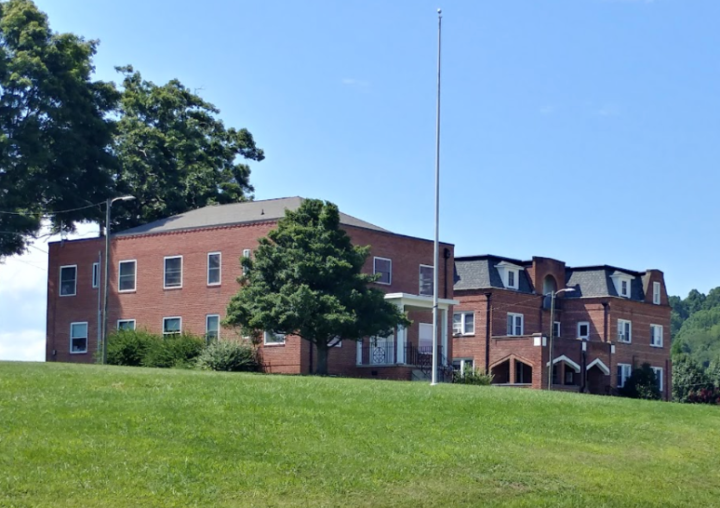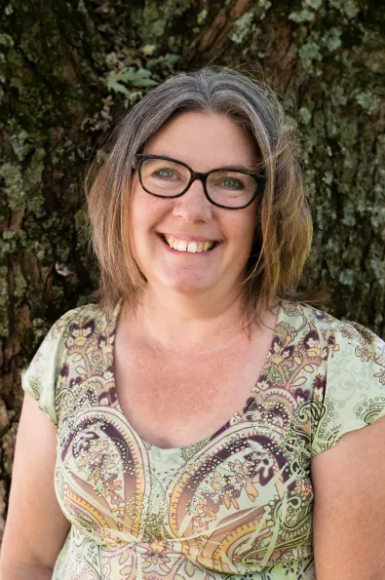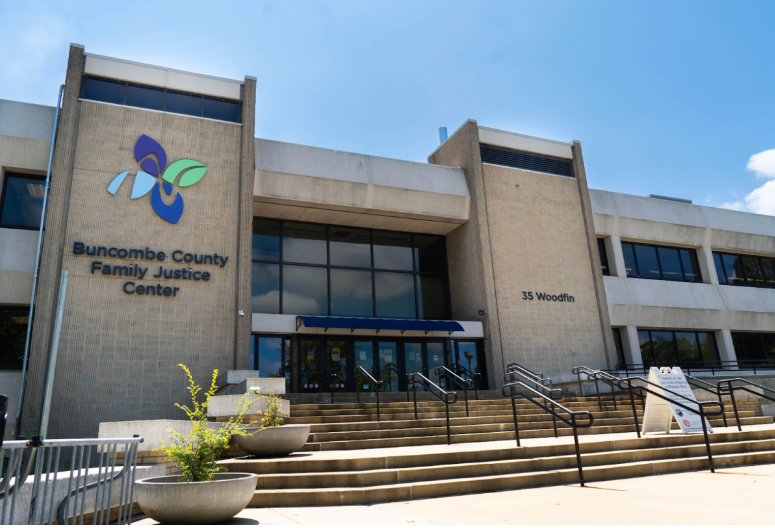by Andrew R. Jones, avlwatchdog.org
The shortage of Buncombe County foster homes is so acute that many youths, some struggling with complex mental health issues, must sleep sometimes for multiple nights in county offices, meeting spaces, therapeutic rooms and even Mission Hospital’s emergency department.
Children have slept in Department of Social Services rooms at least 61 nights this year, according to data the department submits weekly to the state. But Buncombe started recording the data only in mid-February and lacked numbers for all weeks through August, so the amount is likely higher, according to Rebecca Smith, Buncombe’s social work services division director and foster care and adoptions program administrator.
In a single week in February, three children slept in county-owned spaces, according to the data. One kid had to stay in offices every night during another week that month.
These stays have been so common that in September 2022 Buncombe converted a room it leases into a bedroom. The space, located next to visitation, therapy, and family rooms, offers two beds that can be used if the overnighters are siblings. If two unrelated children are using DSS offices overnight, only one can use the bedroom, Smith said, meaning the other child has to sleep in another room.
“It’s really an emergency, because when a kid comes in at nine o’clock at night, all these other agencies are closed, no one’s picking up their phone, and what we don’t want to have is them literally sleep on the couch in this building,” said Amy Huntsman, Buncombe County Department of Social Services licensing supervisor, referring to the Family Justice Center in downtown Asheville.
Across North Carolina, a lack of foster homes, brought on by a dearth of interest and the COVID-19 pandemic, plagues the social services system. Foster care home availability dropped by more than 18% between the 2019-23 fiscal years, from 7,144 to 5,849, according to data provided to Asheville Watchdog by the North Carolina Department of Health and Human Services.
Before that bedroom was created, children were spending the night at the Buncombe County Family Justice Center and sometimes with social workers at local hotels. That’s no longer necessary, and children haven’t slept at the Justice Center in a year, with one exception, Smith said.
Besides providing space for overnighters in DSS offices, staff said, the county buys clothes and other necessities for them and keeps a fridge and pantry stocked. The room has a private bathroom for showers. Children receive 24-hour supervision, with one or two staff overseeing each child. Buncombe takes them to the doctor and dentist for check-ups.
But staff know the arrangement is detrimental to the children.
“We’re really fortunate to have this spot, but the unfortunate part about it is that it’s not helping that kid at all,” Huntsman said of the bedroom. “They’re having different social workers come in all day long to check on them, watch them, supervise them, take them to get something to eat. It just takes this time of trauma and flux and just compounds it for these children. It’s not great by any means, but it does happen.”
That bedroom had been occupied less frequently recently, Huntsman said in late August.
“It was a very stressful situation,” Smith said of the time before the spare bedroom. “We’re not set up to house children in the office. It was a reaction to a failure in our system, if I’m being honest, related to mental health placements. The majority if not all of these situations are children who are in need of leveled placement, meaning they aren’t going to be placed in our family foster homes. They have a need for therapeutic intervention. And that intervention is not readily available or in a timely fashion.”
‘There’s nowhere for them to go’
The reason children are sleeping on couches and pull-out beds comes down to a deficit in foster homes, especially those capable of tackling mental health needs, according to social work staff and local foster care agencies The Watchdog interviewed.
“There are two big reasons for the decline in the number of foster parents in North Carolina,” said Hannah Jones, an NCDHHS spokeswoman. First, not enough new North Carolina parents are applying to foster, Jones said, adding that some face medical challenges or have decided to “retire” from fostering altogether.
Second, the COVID-19 pandemic stalled new foster home licenses because pre-service training had to be adapted for online users, and foster parents’ fingerprints appointments and home fire inspections were delayed, Jones said.
Not only are local DSS offices having to board children overnight, they also have to place children farther from their county when an available placement is located, Jones said. “Social workers are having to drive longer distances to see the children and to transport the children to visitations with their family (and) are also having to find new services providers for children in the county the child has been moved to,” Jones said.
“This is something that is a statewide discussion,” said Cindy Davis-West, CEO of Eliada Homes, which trains foster parents and just opened four respite beds — temporary housing for children who can’t get immediate placement in foster care homes.
“There are calls at a state level … like, ‘We have children on DSS couches,” Davis-West said “They’ve been removed from the home, there’s nowhere for them to go or they’re stepping down from a higher level of care. … We had a fundraiser a few weeks ago and something that I always want to do with our donors and people who come to events like that is really to educate them, and I was like, ‘We have children on DSS couches. I’m confident you don’t know that and that’s not OK.”
As of late August there were 337 children ages 0-17 in the Buncombe foster care system and another 43 who are 18 or older, according to data provided to The Watchdog. There were 60 foster homes licensed by DSS in Buncombe and 34 licensed relatives as of early September. Buncombe has had an average of 85 foster homes and licensed relatives since 2019.
Between public and private foster care programs, there were 197 licensed foster care homes in Buncombe as of the end of June, according to data provided by the NCDHHS, down from 202 the previous June.
According to case management data, 576 children entered Buncombe’s foster care between 2019 and 2022.
The difference between Buncombe DSS foster homes and other agency homes is that Buncombe works only with children who live in the county.
Of those 380 children, 75% live in some type of family situation — 51% are in foster homes, 7% are in licensed relative homes and 17% are in unlicensed relative/kinship placements, according to social work case management data reported to the state. The other 25% reside in licensed residential facilities, the hospital, mental health facilities, and juvenile detention centers.
There are about 80 children who are in the Buncombe foster care system who live with families outside the county.
“There are often tough choices that come with how we best support these children when they are in our custody,” Buncombe social worker programmer Lizzi Shimer said.
Huntsman, the licensing supervisor, said every county lacks enough beds.
“The need is there. And it’s not just Buncombe County,” Huntsman said, adding the need has been magnified not only by the ripple effects of the opioid epidemic but also by a sharp increase in mental health needs.
“Kids that are coming in have more complex trauma than we’ve seen before,” Huntsman said.
An increase in emergency room sheltering
That complexity means children sometimes spend nights in Mission Hospital’s emergency department, too.
“I think one of the big factors is just an increase in mental health needs,” said Dr. Richard Zenn, chief medical officer and executive vice president of Vaya Health. He said the number of cases has been rising exponentially over the past 10 years, especially during the pandemic.
Vaya is one of the state’s six behavioral health management organizations that coordinate mental health services for NC Medicaid Direct beneficiaries. Its staff works with Buncombe DSS daily to find placement for children.
Mission has beds for psychiatric patients, Zenn said, but those are often full as well, which is why children end up in the pediatric section of the emergency department.
“Many children we can find a good placement for within a couple of days, and some children unfortunately, it just does take longer, particularly if they’ve been in certain places already,” Zenn said of these emergency department stays. Some places “feel like they can’t help a child,” Zenn said. “I think those are the ones that we’ve struggled with the most.”
The hospital stays usually last less than a week and rarely longer than a month, Zenn said.
“The Mission teams stabilize the acute psychiatric needs of these patients when they arrive at the ER,” said Mission spokesperson Nancy Lindell. “However, our additional behavioral health beds at Sweeten Creek Mental Health and Wellness Center are for those who meet the criteria for acute inpatient psychiatric hospitalization.
“For those youth that do not meet that criteria, our ER social workers partner closely with Vaya Health, DSS, and other organizations to find long-term homes for these children to transition as soon as they are available. We frequently care for patients where emergency medicine is not the appropriate setting, and we hope the future (North Carolina) Medicaid expansion will allow for more options available.”
Lindell did not respond to questions about how many children have stayed in Mission’s emergency department in 2023 or how long they stayed.
“It’s not as though people are ignoring this issue,” Zenn said of these hospital stays. “We are all really looking at how we can help prevent children from having to go to the emergency department as much as they are.”
A statewide crisis
Outgoing Democratic governor Roy Cooper released a $1 billion plan in March to address behavioral health and resilience in the state.

There were 5,849 licensed foster care homes in North Carolina and 11,828 children in regular and extended foster care combined at the end of June, according to data obtained by The Watchdog.
“North Carolina children with complex behavioral health needs require placements with strong supporting services,” Cooper’s plan said. “Until those spots and treatments are available, they have nowhere else to go.”
Up to 80% of foster care children have significant mental health issues, according to research cited on childwelfare.gov.
“The children that we have in the offices and the children that are sleeping in hotel rooms, they are not the cute cuddly one-year-old; they are not the well behaved 7-, 8-, 9-year-old,” said Gaile Osborne, a foster parent, Asheville resident, and executive director of Foster Family Alliance. “These are teenagers that have incredible, incredible trauma through many different avenues. They are children that are 6-, 7-, 8-year-olds that have autism or that are violent. But they’re still children. That’s what we have to remember. These children deserve a home even with all that they have.”
Osborne said she was recently contacted four times in eight weeks about a boy with autism.
“Can you think of a family that will take this child?” DSS workers asked her. It’s unknown where the child was placed.
Buncombe doesn’t have enough treatment foster care homes, Osborne said, referring to homes licensed to care for high-needs children. “We don’t have group homes that are able to support these children. We don’t have residential facilities that are adequate.”
There’s not only a deficit of foster homes, Osborne said, there’s a deficit in mental health services.
Though some want to lay the blame for a lack of homes at local DSS office doors, Osborne said that’s misguided.
“We all have a piece of this,” Osborne said. “You’ve got to turn to solutions. This is a crisis, but throwing mud is not going to change anything.”
A need for ‘strong, committed’ foster families
“There are hundreds of children in care, but not nearly enough homes,” Buncombe County’s Social Work Services website says. “This means that many children are placed in group homes, away from their siblings or sent out of the county, far away from everyone and everything they know. We need strong, committed foster families to provide safe, nurturing homes for the children in our community.”
Nadine Robinson’s home is one of those.

Robinson, 52, and her husband Steve, 53, have three biological children, one adopted daughter and were fostering four children in their home as of Sept. 18. Since the couple became licensed in 2016, she said, they have had more than 40 children live there.
They tried to become foster parents when they were just teenagers but decided against it.
Ultimately their church brought them into the world of foster care.
Inspired by a couple in their 70s who had “some really hard cases” come through their home, Robinson said she and her husband asked themselves, “Why are we assuming we can’t do it when we see everything they’re facing, and they continue to do it?”
The Robinsons’ first placements were a three-year-old and an 18-month-old whose mother had placed her children in a foster home because she had stage four lymphoma. Months later the Robinsons took their first long-term placement, a four-day-old from Burke County who stayed with the Robinsons for 19 months.
The ebb and flow of lives through her home has not been easy, however. When the Burke County baby left, Robinson said, “it was like having a death. I was grieving and I said, ‘I’m done. I just need a break.’
She put her home on a do-not-call list.
But she got a call. A child she’d had through Buncombe DSS needed a place. His parents were homeless and the mother told Robinson she was struggling.
Thirty minutes later, she agreed to take the boy for a short while.
It wasn’t the last time she would agree to take a child when she felt she didn’t have the emotional strength, still reeling from losing the last one.
At 1 o’clock one 2018 morning, she drove to DSS to pick up a 21-month-old girl for the weekend. Today that girl is the Robinsons’ adopted daughter.
Robinson said seven years of foster parenting has changed her.
“I think I have a lot more grace for the world,” she said. “I’ve learned not to take everything for granted.”
And, she said, she rarely has a conversation without mentioning the importance of working in foster care.
“There are so many children, and everyone has basically the same fears,” Robinson said. “You’re afraid of what you’re inviting into your home, you’re afraid you’re not going to be a good enough parent and sometimes all these children need are for you to be there. You don’t need to be good enough. You just need to be present.”
Private agencies also face shortage
Private foster care agencies also feel the pressure of not having enough parents.
“It takes us anywhere from two to five months to find placements,” Davis-West, the Eliada CEO, said. “Especially teenagers.”
Eliada is one of about 15 private agencies providing foster care services in Buncombe and is acutely aware of the shortage, so much so that it opened a respite program this March in partnership with Vaya Health.
“Respite is an effective tool so long as it’s not used like we’ve had to use it with a couple of the children,” Davis-West said.
Those children have stayed in respite for longer than the standard 14 days sometimes because it’s been difficult to place them.
“We have children that have come through respite three and four times because they still cannot find them a foster home,” Davis-West said.
She said a majority of children in Eliada’s respite program come from DSS and Eliada’s beds are “consistently full.”
Eliada has 10 foster families but is trying to recruit more.
“We’ve got parents in training right now and we have a couple of new families that just came online and their beds are already full,” Davis-West said. “I mean, the beds are going to be full before parents even start.”
Anyone interested in fostering a child might begin by connecting with Buncombe County, which has information on the process on its website. You can call 828-250-5868 or email familiesforkids@buncombecounty.org. Links to other foster care programs in the county can be found at ncdhhs.gov.
Asheville Watchdog is a nonprofit news team producing stories that matter to Asheville and Buncombe County. Andrew R. Jones is a Watchdog investigative reporter. Email arjones@avlwatchdog.org. To show your support for this vital public service go to avlwatchdog.org/donate.




Before you comment
The comments section is here to provide a platform for civil dialogue on the issues we face together as a local community. Xpress is committed to offering this platform for all voices, but when the tone of the discussion gets nasty or strays off topic, we believe many people choose not to participate. Xpress editors are determined to moderate comments to ensure a constructive interchange is maintained. All comments judged not to be in keeping with the spirit of civil discourse will be removed and repeat violators will be banned. See here for our terms of service. Thank you for being part of this effort to promote respectful discussion.